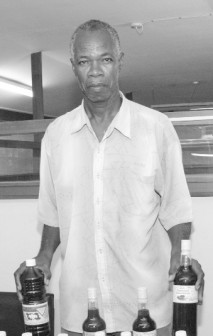When Jethro Warner arrives in Canada early next month to attend the May 8 -14 SIAL Agricultural Trade Show uppermost in his mind will be securing a toehold for his products in the North American market. However, he is a pragmatic man and is acutely aware of the distance which he still has to travel to meet the rigorous standards of the external market.
Since 1999, Warner has been manufacturing his popular Jet’s brand of nutritional beverages, not least his Noni drinks and juices at his modest De Kendren factory. Jet’s Enterprises is a small, unpretentious family venture that bears many of the limitations of many agro-processing ventures across Guyana. Warner has survived, even grown, through sheer perseverance, a supportive family and an approach to marketing that engages shops and supermarkets directly rather than through the more costly method of media advertising.

The Warners have established outlets for their brand at several shops and supermarkets on both sides of the Demerara River. If some of their produce has found its way into shops elsewhere in the Caribbean, this has been the result of modest export initiatives undertaken mostly by middlemen who have faith in the quality of what Jet’s Enterprises produces. A point has now been reached, however, where the Warners — Jethro, his wife Simone and their six children — are looking to break into “the big time,” the overseas market. That is the reason why he is joining four other Guyanese agro processors travelling to Toronto next week.
While Jet’s product range derives from the processing of various fruits and barks including cherry and mauby bark, Warner says that his ‘star’ products are his Noni drinks and juices. Both in the region and in metropolitan countries, Noni has been successfully marketed as a fruit that possesses important health properties. It has a well-known history of use as a preparation for joint pain and skin conditions and its juice is consumed in several countries as a general health tonic, as well as for cancer and chronic conditions such as cardiovascular disease and diabetes. Labo-ratory research has indicated that the fruit has antioxidant, immune-stimulating, and tumour-fighting properties.
Warner’s own Noni drinks and juices have benefited significantly from the huge marketing drive which the fruit has attracted on account of investments made mostly by Asian firms that have popularized its byproducts. Though he backs the quality of his own products to match those which are produced abroad, he is aware of his packaging and labelling limitations. Not that these have not improved significantly in recent years but Warner understands only too well that packaging and labelling are critical marketing tools and he is yet to match that which is regularly displayed on supermarket shelves abroad.
There are, however, several aspects of the Jet’s operations which, unquestionably, are to be applauded. The fruits that are processed into drinks at his De Kendren factory are all cultivated at the Warners 6.64-acre farm at De Kendren. The farm also provides cash crops some of which are sold to subsidize the Warners’ income. The rest is eaten by the family. The farm, however, has its challenges, not least of which is praedial larceny. Losses, Warner says, are heavy and what disturbs him is the fact that there are occasions when he has to buy items of food for his family’s consumption which he grows on his farm.
His bigger concern, however, has to do with access to his farm which is impeded by the presence of a squatter community and a trench across which there is no bridge. Warner says that in the circumstances he is unable to move either farming machinery to his farm to properly cultivate the land or equipment in which to transport his produce from the farm. He must access the farm by a longer route and when harvesting time comes he needs to hire additional labour to fetch the produce from the farm. He has, he says, raised the matter with both the local Neighbour-hood Democratic Council and with the Minister of Agriculture, and he wants both to be reminded that bridging the trench and creating an access point through the squatter settlement would at least deal with the problem of quick and easy access.
Theft notwithstanding, Warner says that fruit is “no problem.” Noni beverages aside, his product range includes drinks manufactured by processing other fruit including tamarind, cherry and ginger. Products manufactured from popular barks include capadulla and mauby beverages.
Jethro Warner and his family represent examples of agro-processors who appear determined to go forward, whatever the challenges, but it is clear that they would do much better with institutional help. Exercises like the Toronto Agricultural Trade Fair, for which local enterprises are benefiting from partial Canadian funding is the kind of opportunity which, Warner says, small Guya-nese businesses need. He intends to take full advantage of that opportunity.





